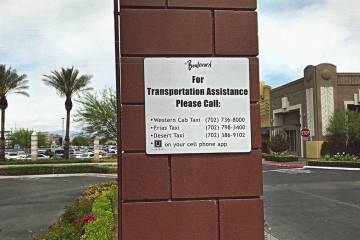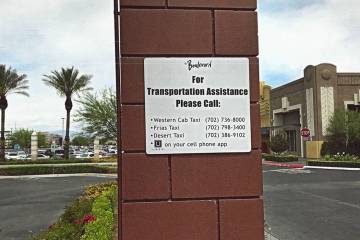Column: Don’t let what killed little Julian happen again
When children stick something in their ears or noses, it’s noticeable. When they swallow something, it’s not.
When 22-month old Julian Wilson swallowed a small battery, nobody saw him, nobody knew it had happened. He had a poor appetite and slept restlessly, but until he lost consciousness, his mother and grandmother didn’t know he had a problem, one which proved to be fatal Oct. 18.
“He ingested something nobody knew he had ingested,” Clark County Coroner Mike Murphy said.
In Australia in July, the same thing happened to a 4-year-old girl, who also died.
In Julian Wilson’s case, according to his grandmother Elena Derbyshire, there was no way of knowing how long the battery was in his stomach, damaging both his stomach and esophagus.
Murphy said Julian basically bled out, despite the extended efforts of paramedics and medical personnel at Sunrise Hospital to save him. Doctors didn’t know what had happened to him because the X-ray didn’t show anything. The small battery the size of a flat button wasn’t found until the autopsy on the little guy’s body. When he died, he had a collapsed lung and multiple lacerations of his esophagus and stomach.
His grandmother declined a follow-up interview this week, saying it’s still hard for her to talk about Julian’s death. And his 16-year-old mother didn’t want to talk about it. Understandable.
The police and the Clark County Division of Family Services have an open investigation and the Clark County Child Death Review Committee automatically reviews the deaths of children under 18.
Small children can find small batteries in remote controls, toys, games, cameras, watches, hearing aids, flashing jewelry, even singing greeting cards. Or they can find them in the trash where they have been tossed. Families often keep their various batteries in one easily accessed place, making is easier for toddlers to find.
Jeanne Marsala from Sunrise Hospital told R-J reporter Wesley Juhl that swallowing batteries is a growing trend because of the prevalence of hand-held devices. She said almost 3,000 children a year are treated in emergency rooms after swallowing batteries.
“We haven’t seen a lot, so it’s not overly common for us,” the coroner said. “The vast majority of time, there’s medical intervention and they survive.”
There must be enough deaths to make it profitable to personal injury attorneys. One Texas law firm solicits cases involving children and batteries on the Internet. But the law firm also offered some helpful tips:
■ Discard button batteries carefully.
■ Do not allow children to play with button batteries, and keep button batteries out of your child’s reach.
■ Caution hearing aid users to keep hearing aids and batteries out of the reach of children.
■ Never put button batteries in your mouth for any reason as they are easily swallowed accidentally.
■ Always check medications before ingesting them. Adults have swallowed button batteries mistaken for pills or tablets.
■ Keep remotes and other electronics out of your child’s reach if the battery compartments do not have a screw to secure them. Use tape to help secure the battery compartment.
■ If a button battery is ingested, immediately seek medical attention. The National Battery Ingestion Hotline is available anytime at 202-625-3333 or call your poison center at 800-222-1222. (Remember how I recently advised you to keep that number on hand?)
Child-proofing a home is easy to say and difficult to do. Obviously batteries can kill.
In her email to me while I was on vacation, his grandmother asked, “Can you run an awareness story, as I don’t believe that people realize that something so small can take life away in a second.”
This column is for Julian Wilson, dead and not quite 2 years old. And if it saves just one other child, it’s a good column.
Jane Ann Morrison’s column appears Monday, Thursday and Saturday. Email her at Jane@reviewjournal.com or call her at 702-383-0275.






















